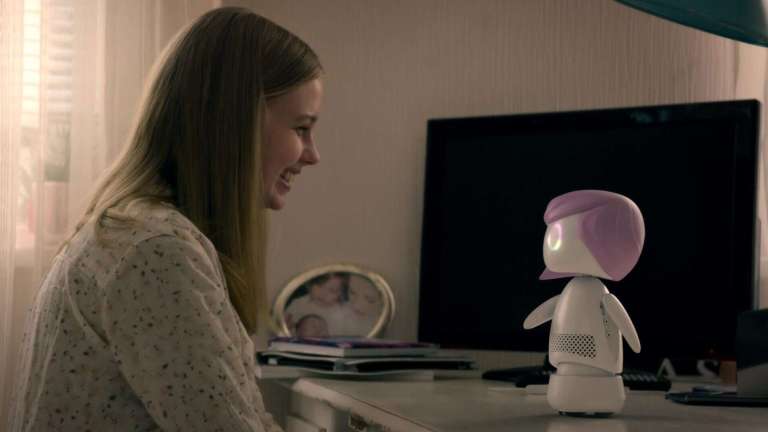Black Mirror Season 5 Episode 3 Review: Rachel, Jack, and Ashley Too
The ingenious casting of Miley Cyrus elevates the surprisingly funny final installment of Black Mirror Season 5. Our review...

This Black Mirror review contains spoilers.
Black Mirror Season 5 Episode 3
It’s fitting the Miley Cyrus was chosen to embody trapped pop sensation Ashely O in Black Mirror Season 5’s “Rachel, Jack, and Ashley Too,” as her own Disney-fied past is likely filled with similar stories of content restriction and yearning to stretch her art to darker or more adult places. However, Cyrus is also perfectly cast because the plot of “Rachel, Jack, and Ashley Too” is eerily similar to the sort of feature one could imagine Cyrus starring in back when she was under Mickey Mouse’s thumb.
Remove some of the curse words and drug content and slap a zanier score on top, and it’s not hard to imagine this exact story as the basis of an original Disney Channel movie. The warring sisters who learn to bond, an inattentive, inventor parent with a quirky profession, a cartoonish villain with a ridiculous scheme, and a sassy robot sidekick would all feel right at home under Disney’s roof. The moment where the real Ashely O starts sharing quips with her robot doppelganger, like discussing the sound acoustics of an arena, while two teenage girls frantically drive her through an anonymous downtown, is when the whole thing starts to feel like a boilerplate third act of a body-swap comedy aimed at kids.
However, I’m not quite sure that’s a bad thing! As a child of the ‘90s raised on these exact kinds of films, there’s something fun about watching Charlie Booker operate in this mode. Tonally, “Rachel, Jack, and Ashley Too” is the most comedy-focused episode of the series since Season 1, and despite Aunt Catherine’s villainous plan involving involuntarily inducing a coma on her niece, the episode never reaches the terrifying darkness found in the typical Black Mirror outing. Booker goes back to his well of digitally transferring consciousness, but here it’s played for laughs, with the fully awakened Ashley Too spouting off lines like “Get this cable out of my ass!”
That said, it’s not as if “Rachel, Jack, and Ashley Too” is entirely juvenile, as it addresses many ethical questions that are currently popping up in the music world. With hologram tours of Roy Orbison, Dio, Whitney Houston, Frank Zappa, and others in the works, this episode imagines what the next step could be, a world where over-zealous managers could wrestle control away from difficult creatives to score that lucrative tour money. I mean, it wouldn’t be Black Mirror without a little paranoia, right? The posthumous album already conjures icky feelings about respect, legacy, and artistic intent but this episode takes that feeling to the extreme by wondering how artists’ voices could be manipulated in the future to keep pushing out content regardless of their involvement. For viewers interested in such moral quandaries, there’s plenty to chew on.
As far as performances go, Angourie Rice (The Nice Guys, Spider-Man: Far From Home) perfectly portrays shy, vulnerable Rachel, instantly conjuring images of last year’s Eighth Grade as she anxiously walks down her school’s hallways and longingly gazes at a poster for the school talent show. Madison Davenport (Sharp Objects) feels like she’s stretching to play Jack, the tough sister with the 120 Minutes taste in music, but she excels at playing the broad comedy, like when she has to stall as Rachel and Ashely Too try to free Ashley O from her coma. And Cyrus looks right at home as the detached Ashley O, but oddly enough, truly comes to life voicing the sparkplug Ashely Too. Lines of dialogue feel a little clunky here and there, and the music, written by Isobel Waller-Bridge (sister of Phoebe), leaves a little to be desired, even if Ashley O’s oeuvre is supposed to be filled with vaguely empowering, humdrum pop, but it suffices.
Many will probably be thrown by “Rachel, Jack, and Ashley Too” as it feels strangely dissimilar from the rest of Black Mirror’s episodes, but if you embrace the humor, and the overall throwback, all-ages fun of the plot, it stands as a winning entry in the series, elevated by Cyrus’ involvement, which works on multiple levels. Just as Ashely O had to inject some doom and gloom into her art, Charlie Booker is better off for introducing a little bit of playfulness into his.
